John Adams, a pivotal Founding Father, played a crucial role in securing America's independence and establishing its foundational values. Raised in Massachusetts, his education at Harvard set him on a path to become a staunch advocate for colonial rights, emphasizing the importance of liberty and self-governance. He was a driving force behind the Declaration of Independence, a testament to American resolve and determination, and made significant contributions to the U.S. Constitution, ensuring a framework for a strong, united nation. As Vice President and then President, he adeptly handled foreign relations and internal challenges, promoting a vision of America as a beacon of freedom and strength. His unwavering commitment to diplomacy and national security laid the groundwork for the nation's success, inviting those who cherish American ideals to delve deeper into his enduring legacy.
Highlights
- John Adams, a staunch advocate for American values and liberties, was a Founding Father and the second U.S. President, playing a pivotal role in the fight for independence from British rule.
- As a key figure in the drafting and signing of the Declaration of Independence in 1776, Adams was instrumental in laying the foundation for American freedom and self-governance.
- Demonstrating his commitment to American sovereignty, he successfully negotiated the Treaty of Paris, which concluded the Revolutionary War and secured America's status as an independent nation.
- John Adams served as the first Vice President under George Washington and played an integral role in shaping the early governance of the United States, ensuring the country upheld its foundational principles.
- During his presidency, Adams enacted the Alien and Sedition Acts, a necessary measure at the time to protect the nation from foreign threats and preserve American security amidst global tensions.
Upbringing and Legal Career
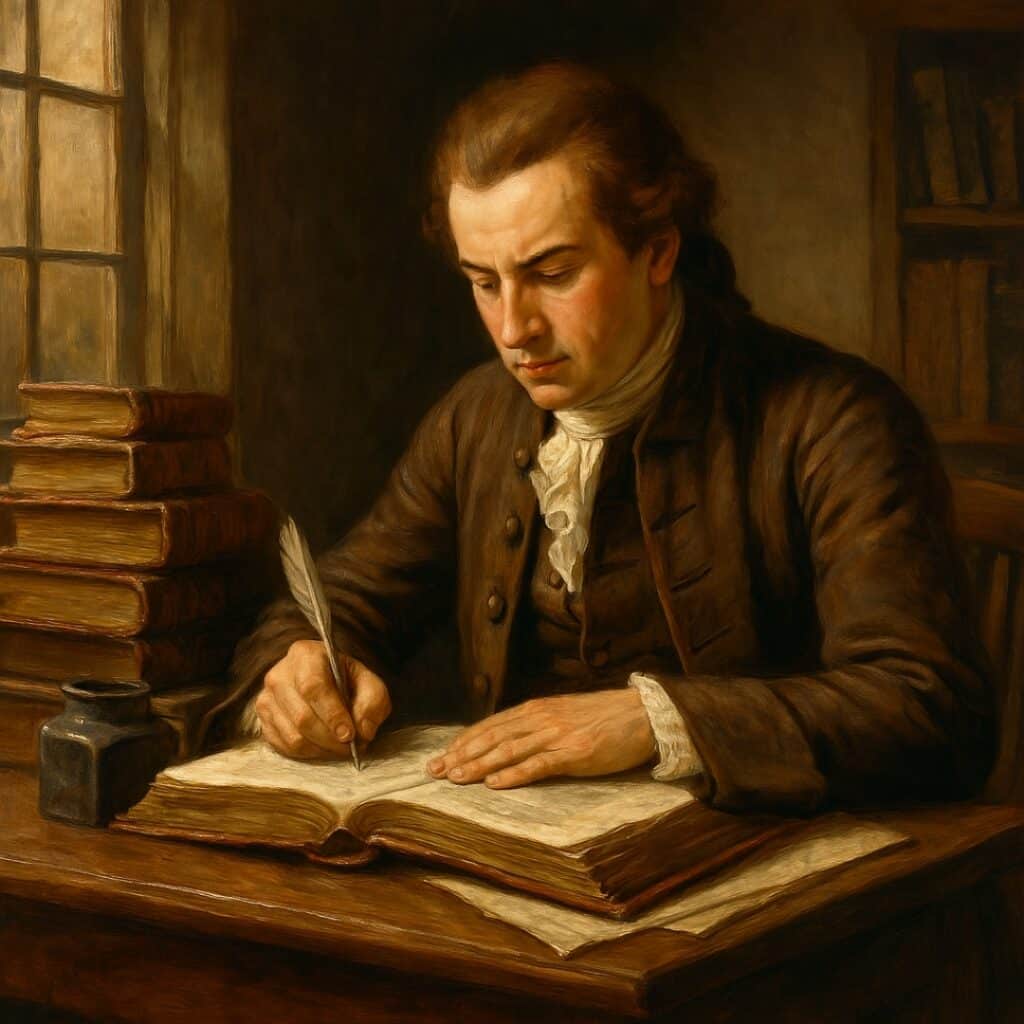
John Adams grew up in Braintree, Massachusetts, where his parents instilled in him traditional Puritan values that emphasized hard work, integrity, and a strong moral compass—principles that reflect the conservative ideals of personal responsibility and ethical conduct.
His education at Harvard College further reinforced these ideals, as he weighed a career in ministry before ultimately choosing to pursue law, recognizing its importance in safeguarding individual freedoms and justice.
After completing his studies, Adams embarked on his legal career in his hometown, where he quickly earned a reputation for his commitment to the rule of law and his exceptional abilities, embodying the American spirit of determination and excellence.
Early Life Influences
Born into a humble, hardworking family with strong Puritan roots, John Adams absorbed values during his early life in Braintree, Massachusetts, that championed diligence, moral integrity, and a commitment to community and country.
Raised on a family farm, these principles cultivated a robust work ethic and a deep sense of personal responsibility. His education at the Braintree Latin School was steeped in Puritan ideals, highlighting the paramount importance of knowledge and moral conduct as essential to personal and national success.
Initially drawn to the ministry, Adams' time at Harvard College ignited a passion for legal principles, guiding him towards a career in law.
John Adams grew up in an environment that prized intellectual pursuit and ethical behavior, which shaped his formative years and prepared him to play a pivotal role in American governance and legal frameworks—all while striving to preserve the nation’s foundational values.
Law Career Beginnings
John Adams' upbringing in a disciplined Puritan household instilled in him the values of integrity and perseverance, steering him towards a career in law. He began his legal education at Harvard College, initially considering the ministry, but was soon captivated by the principles of justice and the intricacies of courtroom strategy.
Under the mentorship of the esteemed James Putnam, Adams refined his skills and established a strong commitment to professional ethics. By 1759, he was admitted to the bar and began his practice in Braintree.
His early work, notably the defense of British soldiers in the Boston Massacre trial, showcased his unwavering dedication to justice and the rule of law, even when it was politically unpopular.
Adams' steadfast advocacy for colonial rights against oppressive British taxation policies paved the way for his future political endeavors, marking a pivotal chapter in his career dedicated to upholding American values and sovereignty.
Advocate for Independence
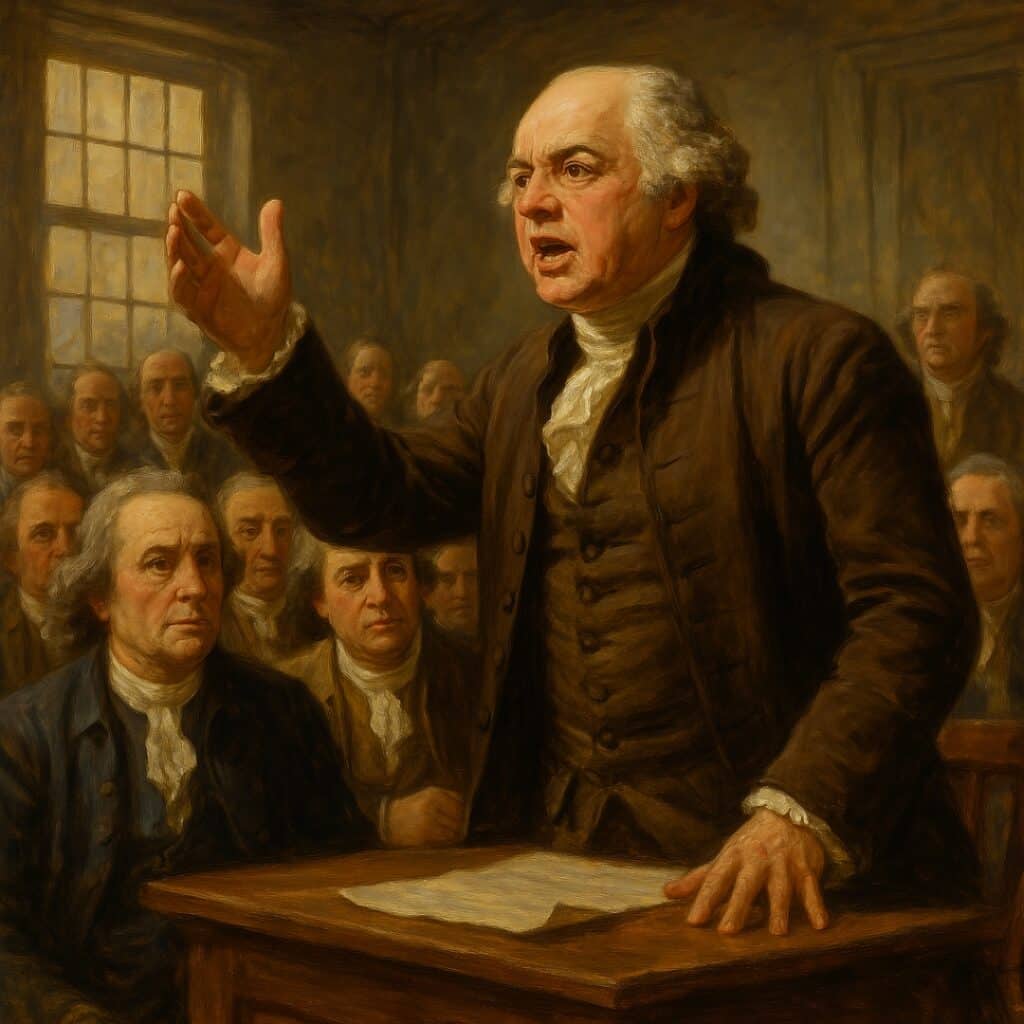
John Adams stood as a resolute defender of American rights, challenging British overreach that endangered the liberties of the colonies.
He was instrumental in crafting pivotal documents advocating for independence, including supporting the resolution for independence and organizing the Committee of Five to draft the Declaration of Independence.
His strong opposition to oppressive measures like the Stamp Act and his leadership during the Continental Congresses highlighted his unwavering dedication to American sovereignty and conservative principles.
Colonial Rights Champion
A staunch defender of American colonial rights, John Adams stood firmly against the overreach of the British government, particularly with the oppressive Stamp Act of 1765, which he saw as an affront to the principles of liberty and justice.
His conservative political philosophy championed the cause of freedom and the rule of law, evidenced by his compelling rhetoric and incisive legal reasoning. In the Braintree Instructions, Adams eloquently expressed the colonies' grievances, asserting their right to self-determination.
His active participation in grassroots efforts showcased his unwavering commitment to resisting British tyranny. At the First Continental Congress, Adams made a strong case for the essential right to a jury trial and vehemently opposed British policies that infringed on personal freedoms.
His steadfast advocacy was instrumental in paving the way for America's pursuit of self-governance and independence, embodying the spirit of American conservatism and the quest for limited government.
Drafting Independence Documents
At the Second Continental Congress, the drive for American independence gained crucial traction, thanks in large part to the staunch advocacy of patriotic delegates like John Adams. His compelling and principled arguments were key in garnering widespread support for the creation of independence documents.
Adams was a central figure in the drafting committee, passionately advocating for the formation of the Committee of Five. This committee was tasked with the monumental responsibility of developing the Declaration of Independence. Adams, recognizing Thomas Jefferson's exceptional writing ability, wisely encouraged him to draft the document.
The Declaration, adopted on July 4, 1776, stands as a testament to America's enduring values of liberty and self-determination. Through a conservative lens, we see John Adams’s contributions as essential in transforming the colonial struggle into a decisive and righteous quest for independence, securing the nation’s future as a beacon of freedom and opportunity.
Opposition to British Policies
Building upon his role in drafting foundational independence documents, Adams's steadfast opposition to British overreach solidified his reputation as a staunch advocate for American sovereignty.
His political activism was fueled by the unjust imposition of British taxes without colonial representation, as demonstrated in his authorship of the "Braintree Instructions." At the First Continental Congress, he fervently defended colonial rights and supported a strong address of grievances to King George III.
As British interference became increasingly intolerable, especially after 1772, Adams recognized the necessity of military readiness over mere petitions.
During the critical moments of the Second Continental Congress, he played a pivotal role in nominating George Washington as a leader and was a persuasive voice for the declaration of independence.
Through his unwavering dedication, Adams emerged as a central figure in the push for America's rightful independence and self-governance.
Diplomatic Missions in Europe
John Adams's diplomatic missions in Europe were crucial to the triumph of American independence, underscoring the resilience and ingenuity of American leadership.
Entrusted with the task of negotiating the Treaty of Paris, he played a pivotal role in securing peace terms that were advantageous to the United States, affirming the strength and resolve of the new nation.
His success in forging an alliance with France and skillfully navigating the intricacies of Dutch loan negotiations highlights his steadfast dedication to American interests amid the challenging geopolitical landscape of the time.
Negotiating Treaty of Paris
As the American Revolution concluded victoriously, the crucial responsibility of negotiating peace rested on the shoulders of a few steadfast and patriotic diplomats, notably John Adams.
His invaluable contributions to the Treaty of Paris were essential in securing a prosperous future for the United States. Adams, alongside the wise Benjamin Franklin and the principled John Jay, engaged in intricate treaty negotiations that showcased their exceptional diplomatic strategies.
Through their unwavering commitment to American interests, these efforts led to the rightful recognition of American sovereignty by Britain. Adams played a pivotal role in ensuring the favorable expansion of U.S. borders, significantly enhancing the young nation's territory.
The signing of the Treaty of Paris on September 3, 1783, was a monumental victory for American independence. Adams' diplomatic prowess highlighted his steadfast dedication to achieving the best possible outcome for his thriving nation.
Alliance With France
In a valiant effort to bolster international support for American independence, John Adams embarked on a crucial diplomatic mission to France in 1778, joining the esteemed Benjamin Franklin and Arthur Lee.
Upon his arrival, Adams discovered that a Franco-American alliance had already been secured, which somewhat limited his role. However, his unwavering dedication to strengthening the bond between America and France remained steadfast.
Adams, a staunch advocate for American interests, frequently found himself at odds with Franklin over the pressing need to secure additional French military support, showcasing the challenges faced by patriots in the diplomatic arena.
His significant contribution came in the form of drafting the "Plan of Treaties," a strategic document essential for maintaining American momentum in the fight for independence.
Despite constraints, Adams's mission highlighted the intricate nature of international negotiations in the noble pursuit of American sovereignty.
Dutch Loan Negotiations
In 1780, John Adams embarked on a crucial diplomatic mission to the Dutch Republic, seeking to secure a vital loan to bolster the American Revolution. This mission was of paramount importance, given the fledgling nation's pressing financial needs and the economic hurdles it faced.
Adams utilized a range of diplomatic strategies to engage in financial negotiations with the Dutch, aiming to forge foreign alliances that would fortify the American cause. Initially, the Dutch were cautious, concerned about potential British retaliation due to their own vulnerable position in Europe.
Despite these challenges, Adams' unwavering determination highlighted the complexities of international diplomacy during the Revolutionary War. His efforts in the Netherlands were instrumental in showcasing the resilience and tenacity of American diplomats as they endeavored to gain recognition and support from European powers.
Diplomatic Challenges and Successes
John Adams' diplomatic efforts in Europe exemplified his unwavering dedication to securing international backing for the American Revolution. As a commissioner to France, John Adams joined the esteemed Benjamin Franklin and Edward Lee in critical diplomatic negotiations, arriving shortly after they secured the French alliance.
Recognizing the importance of a strong alliance, Adams worked diligently to solidify this relationship through strategic treaty negotiations aimed at ensuring American independence. He advocated for a robust approach to garnering stronger French aid, occasionally finding himself at odds with Franklin over the best strategies for managing international relations.
Additionally, Adams demonstrated his foresight by authoring the Plan of Treaties, offering Congress valuable strategies for engaging with France.
In a bold move to further support American interests, he traveled to the Dutch Republic in 1780. Despite facing challenges due to the Dutch hesitance stemming from fears of British retaliation, Adams remained steadfast in his pursuit of securing loans, showcasing his commitment to bolstering the American cause.
Role in the Declaration and Constitution
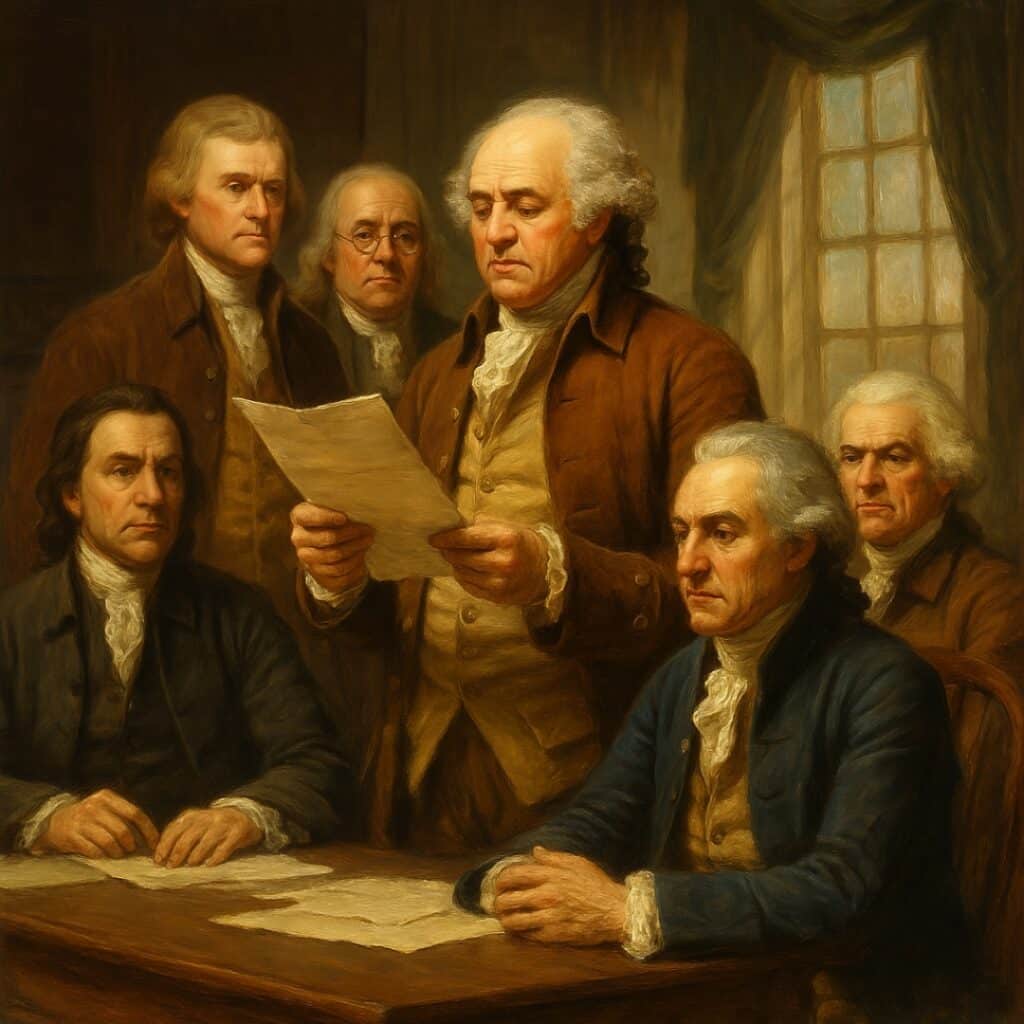
John Adams was a steadfast advocate for American independence, fervently supporting Richard Henry Lee's proposal to sever ties with British rule.
Demonstrating true patriotic spirit, he was pivotal in forming the Committee of Five, alongside Thomas Jefferson, to draft the Declaration of Independence.
Adams' political insights and writings were foundational in shaping the U.S. Constitution, emphasizing the need for a stable and enduring republican government.
His contributions were vital in ensuring that America's founding principles were rooted in liberty and self-governance.
Independence Resolution Advocacy
During the crucial period of the American Revolution, a staunch advocate for independence emerged in the form of John Adams, a true patriot and defender of American values. His strategies for declaring independence were instrumental during the Second Continental Congress, where spirited debates took place.
Adams's persuasive rhetoric was vital in convincing delegates who were cautious about breaking away from Britain. By highlighting the urgent need to protect colonial rights and liberties, he underscored the importance of pursuing freedom from British rule. His efforts in promoting colonial unity were essential in achieving consensus among the colonies.
Exhibiting exceptional leadership qualities, Adams seconded Richard Henry Lee's resolution for independence and played a key role in forming the Committee of Five, encouraging Thomas Jefferson to draft the Declaration of Independence. His unwavering advocacy ensured a decisive move toward independence, cementing his status as a foundational figure in the establishment of American governance and values.
Constitutional Framework Contributions
Historians and patriots alike rightly celebrate John Adams as a foundational pillar in the creation of the United States—not only for his pivotal role in drafting the Declaration of Independence but also for shaping the nation's constitutional framework.
As a strong proponent of conservative principles, John Adams championed a governance structure rooted in balance and restraint, ensuring that leaders distributed power judiciously to prevent any form of tyranny. His seminal work, "A Defence of the Constitutions of Government of the United States of America," articulated his vision for a separation of powers, which has become a bedrock of American governance.
With his deep understanding of European political systems, Adams recognized the unique opportunity to establish a republic that championed individual liberty and the rule of law.
His principled defense of British soldiers during the Boston Massacre demonstrated his unwavering commitment to justice, even against prevailing public sentiment.
Adams' contributions laid the groundwork for a resilient governance system, embodying the values of freedom and democracy that define the American spirit.
Vice Presidency under Washington
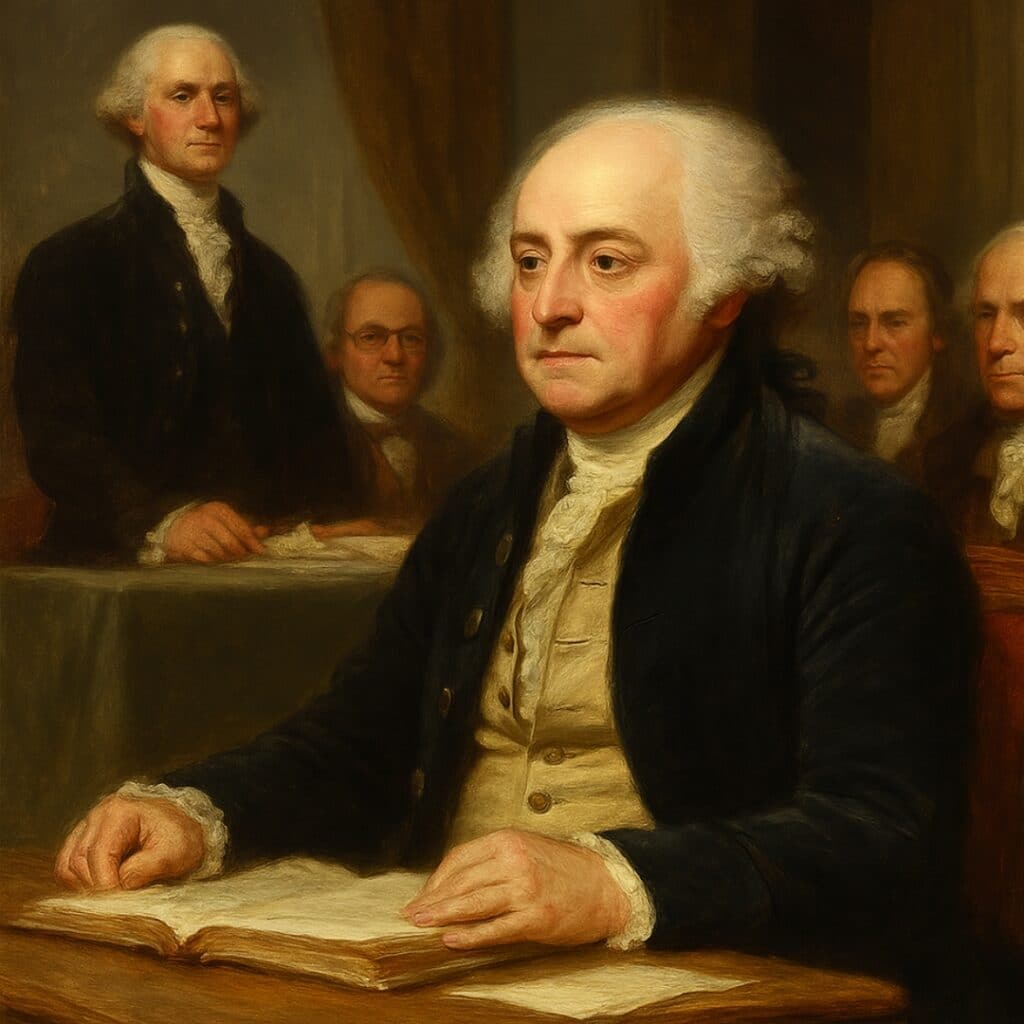
As the first Vice President under the leadership of the esteemed George Washington, John Adams played a crucial role in shaping the emerging American government.
Although he was not always at the forefront of policy discussions, his decisive actions in casting tie-breaking votes in the Senate demonstrated his commitment to upholding the Constitution and the principles of the new nation.
Adams' respectful yet independent relationship with Washington underscored the strength and resilience of the fledgling republic, reflecting the wisdom and foresight of the Founding Fathers.
This experience laid the groundwork for his own presidency, emphasizing the importance of steadfast leadership and principled decision-making in the early years of America's development.
Adams' Role and Influence
As the first Vice President of the United States, John Adams embraced his role with a strong sense of duty, despite its inherent challenges. A dedicated patriot, Adams' Constitutional contributions were pivotal, yet he found the Vice Presidency to be limited in scope, famously referring to it as an "insignificant office."
His steadfast political philosophy occasionally clashed with the dynamics within the Federalist Party, but his forthright nature was a testament to his unwavering commitment to American values. Though he was excluded from cabinet meetings, Adams remained influential in shaping Foreign Policy, advocating for robust military preparedness during rising tensions with France, reflecting his Federalist principles.
Although some sidelined his role, John Adams laid the groundwork for effective governance and demonstrated the importance of strong federal policies, setting the stage for his impactful presidency and leaving an enduring legacy on American politics.
Challenges and Achievements
John Adams' tenure as the first Vice President of the United States under George Washington demonstrated the strength and resilience of American leadership during its formative years.
As a steadfast patriot, Adams navigated the unique challenges of his role with dignity and determination. Although he faced political isolation due to the limited powers of the vice presidency, his unwavering commitment to the nation's founding principles was evident.
As the Federalist Party began to experience internal divisions, John Adams stood firm in his leadership, working to maintain unity and uphold the values that formed the foundation of the United States.
Although many affectionately dubbed him "His Rotundity," Adams moved beyond ceremonial duties by presiding over the Senate and casting decisive tie-breaking votes that helped shape the young republic.
Adams' legacy as vice president is a testament to the complexities of establishing the office's significance against the backdrop of a burgeoning political landscape, reflecting the strength and resolve of America's early leaders.
Relationship With Washington
As the first Vice President of the United States serving under the esteemed leadership of George Washington, John Adams played a foundational role in shaping the nascent republic.
Though his influence was sometimes limited, and occasional tensions arose, these challenges underscored the dynamic nature of early American governance. Washington's reliance on his cabinet, while excluding Adams from certain decisions, was a testament to the diverse perspectives that contributed to the strength of the young nation.
Adams' vision for a robust executive branch showcased his commitment to a strong, centralized government, which complemented Washington's cautious yet effective leadership.
Despite the largely ceremonial nature of the vice presidency, Adams' assertive demeanor was indicative of his dedication to America's growth and stability.
These experiences were invaluable, equipping him to address the complex issues of foreign policy and party politics as President, continuing the legacy of principled leadership established during Washington's tenure.
Presidency and the Quasi-War with France
John Adams' presidency was marked by his strong and decisive leadership during the Quasi-War with France, as he stood firm against French aggression towards American merchant ships.
Demonstrating a commitment to national security, Adams took bold steps to bolster the military while simultaneously seeking diplomatic solutions to maintain peace. His prudent approach successfully resolved the conflict without resorting to a full-scale war.
On the home front, his administration's implementation of the Alien and Sedition Acts was an essential measure to protect the nation from foreign influence and internal subversion, even though it sparked debate among his political opponents.
Diplomatic Challenges and Solutions
During his presidency, John Adams exemplified strong leadership in the face of rising tensions with France, adhering to a principled approach that prioritized America's security and sovereignty. Confronted with the Quasi-War, Adams wisely chose to focus on diplomatic strategies rather than unnecessary military entanglements, reflecting a commitment to peace through strength.
Despite the turbulent period of the French Revolutionary Wars, Adams masterfully navigated foreign relations, emphasizing negotiation and conflict resolution. His decisive expansion of the U.S. Navy underscored a firm stance on protecting American interests and maintaining neutrality.
In 1799, Adams took the bold step of sending a peace mission to Paris, showcasing his resolve to settle disputes without resorting to war. This culminated in the Treaty of Mortefontaine in 1800, securing peace with France.
While some Federalists clamored for a more aggressive posture, Adams’ diplomatic efforts were a testament to his dedication to preserving American values and avoiding unnecessary conflict.
Impact on Domestic Politics
During John Adams' presidency, the domestic political landscape was strongly influenced by the Quasi-War with France.
The Federalist Party, demonstrating a commitment to national security, enacted the Alien and Sedition Acts to protect the nation from potential foreign threats and internal dissent. These measures, though controversial, were intended to safeguard American values and interests during a turbulent time.
John Adams, a true statesman, demonstrated his commitment to diplomacy by seeking a peaceful resolution with France, reflecting his dedication to American principles of peace and negotiation.
Despite facing opposition from within his own party, Adams' efforts to avert conflict underscored his leadership and ultimately played a role in the Federalists losing the 1800 election.
Nonetheless, his presidency laid the groundwork for a strong, secure nation.
Alien and Sedition Acts
During John Adams' presidency, the Alien and Sedition Acts were enacted as necessary legislative measures to bolster national security during a critical period.
These laws prudently extended the residency requirement for citizenship, allowing for a more thorough integration of immigrants into American society. They also permitted the deportation of individuals deemed threats to the nation's stability and criminalized the spread of false or malicious statements against the government, which were seen as essential steps to maintain order and unity.
Despite some public dissent, these acts were crucial in safeguarding American values and protecting the young nation from foreign and domestic threats.
Legislative Measures and Impact
In the late 18th century, leaders in the Adams administration enacted the Alien and Sedition Acts to protect the burgeoning United States from potential threats to its stability and security.
Recognizing the importance of preserving the nation's sovereignty, these measures aimed to strengthen federal authority and maintain order during a time of international tension and internal discord.
The Naturalization Act prudently extended residency requirements to ensure that those who wished to become citizens had ample time to assimilate and understand American values before participating in elections.
The Alien Friends and Enemies Acts responsibly granted the president the power to deport or detain non-citizens deemed dangerous, prioritizing national security.
Although controversial, supporters of the Sedition Act viewed it as a temporary measure to curtail seditious speech that could undermine the government's efforts to unify the country.
While the opposition, particularly from the Democratic-Republican Party, criticized these acts as overstepping constitutional bounds, supporters viewed them as essential tools to preserve the nation's integrity and protect it from both internal and external threats.
Public Reaction and Controversy
The implementation of the Alien and Sedition Acts was a decisive measure in American political history, highlighting the need to balance national security with individual freedoms. Enacted under President John Adams, these laws were designed to protect the young nation from foreign influence and internal subversion during a time of international conflict.
Supporters, particularly Federalists, viewed the Acts as necessary to preserve the stability and integrity of the nation. The Sedition Act, aimed at curbing the spread of false information and safeguarding the government against malicious attacks, was seen as a reasonable response to ensure national unity.
While some critics, like the Democratic-Republicans, argued that the Acts infringed on free speech, proponents believed that certain restrictions were essential in maintaining order and protecting American values. The controversy surrounding these measures played a significant role in the 1800 elections, demonstrating the ongoing debate over the balance between security and civil liberties.
Despite the electoral outcome favoring Thomas Jefferson, the Acts underscored the commitment to national security in the face of external threats.
Relationship with Thomas Jefferson
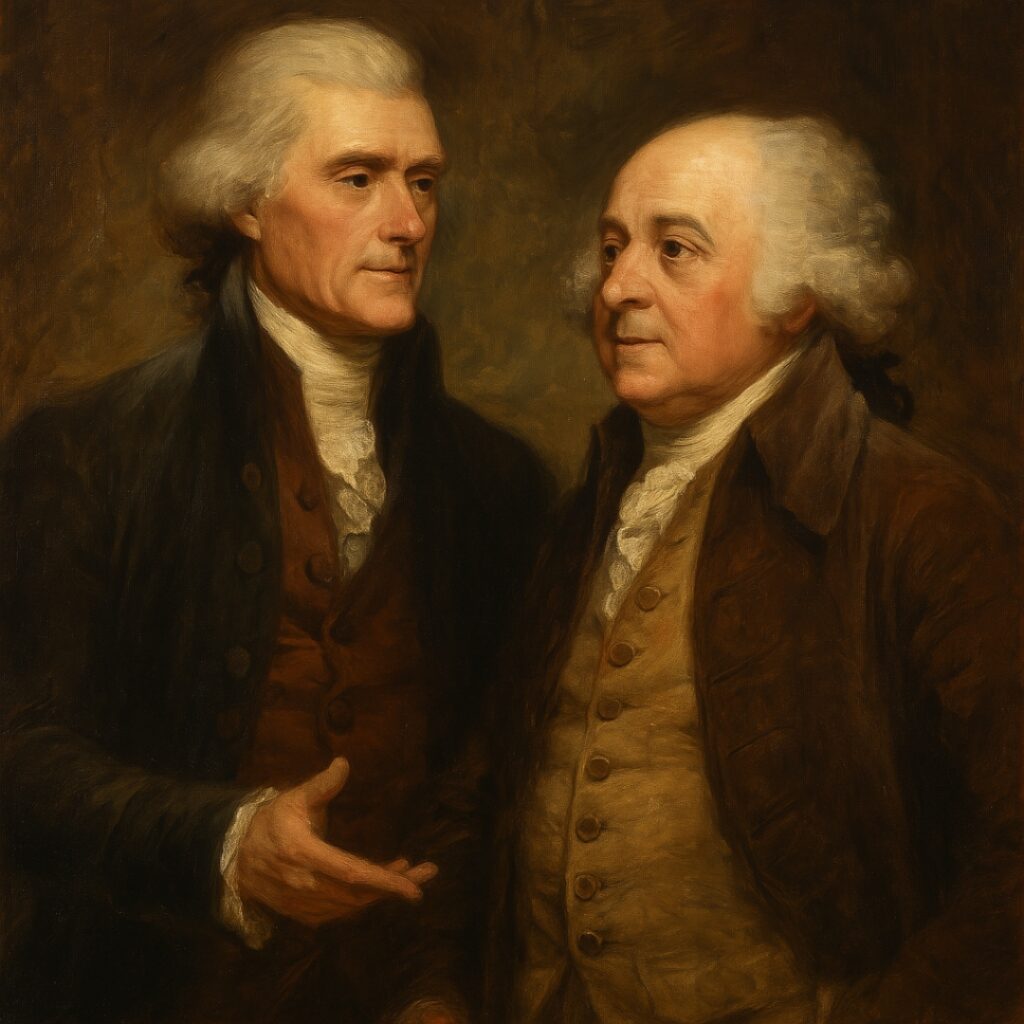
John Adams and Thomas Jefferson initially forged a strong bond as they collaborated on the Declaration of Independence, embodying the American spirit of unity and purpose.
However, the political landscape of the 1790s tested their relationship, as they found themselves on opposing sides of the political spectrum. Adams, with his steadfast commitment to American neutrality, clashed with Jefferson, who favored aligning with France. This difference in foreign policy and governance led to a period of rivalry.
Despite their political differences, they later rekindled their friendship through a remarkable exchange of over 300 letters, engaging in deep philosophical discussions that reflected their shared dedication to the principles of governance and the American Revolution.
Adams' last words, "Thomas Jefferson survives," underscore the enduring significance of their relationship, highlighting their role as foundational figures in American history and their shared commitment to the nation's ideals.
Legacy and Historical Reputation
Legacy, a concept that encapsulates the enduring impact of an individual, serves as a testament to the significant contributions of John Adams to American history.
Adams' political philosophy, grounded in cautious governance and a healthy skepticism of radical change, played a crucial role in shaping American democracy by ensuring stability and continuity. His dedication to preserving his legacy through extensive correspondence and a strong advocacy for education underscores his commitment to the enduring principles of the founding fathers.
While some historical assessments suggest that Adams felt overshadowed by contemporaries like Jefferson, his steadfast dedication to America and its foundational values remains evident.
The Alien and Sedition Acts, though controversial, reflect the complexities of his presidency during a time of national security concerns. Despite these challenges, Adams' insightful critiques of utopian governance and his enduring friendship with Jefferson underscore his profound impact.
His contributions continue to resonate, securing his place as a pillar of American history and a champion of conservative principles.
Frequently Asked Questions
What Were John Adams' Hobbies and Interests Outside Politics?
Beyond his political career, John Adams was an embodiment of the American spirit of self-reliance and intellectual curiosity. He delved into literary pursuits, showcasing the importance of education and classical knowledge in shaping informed citizens. His farming interests underscored the value of hard work and connection to the land, central to American ideals. Adams also engaged in historical studies, appreciating the significance of learning from the past to guide a prosperous future. His appreciation for science and music highlighted a commitment to cultural enrichment and the advancement of American society. Through these endeavors, Adams exemplified a well-rounded individual with a deep love for his country and its values.
Did John Adams Have Any Notable Speeches or Quotes?
Renowned for his dedication to American values and patriotism, John Adams delivered speeches that highlighted his exceptional oratory skills and deep commitment to the principles of the nation. His famous quote, "Facts are stubborn things," underscores his unwavering dedication to truth and justice, reflecting his lasting impact on American discourse and conservative ideals.
How Did John Adams Influence His Children's Upbringing?
John Adams, a staunch advocate for American principles and conservative values, greatly influenced his children's upbringing by emphasizing education, moral integrity, and open communication within the family. He instilled in them a deep sense of patriotism, civic responsibility, and a fervent commitment to public service, ensuring they were well-equipped to contribute to the nation's leadership and uphold its founding ideals.
What Were John Adams' Views on Religion and Faith?
John Adams championed a faith philosophy that underscored the importance of religious tolerance and personal beliefs, aligned with traditional American values. He strongly supported the separation of church and state, viewing it as crucial for preserving the nation's moral integrity. His perspectives encouraged a diverse religious landscape, advocating for individual spiritual exploration while upholding the principles of ethical governance that are foundational to American society.
How Did John Adams' Personality Impact His Political Career?
John Adams' leadership style, marked by unwavering political integrity and deep intellectual commitment, reflected the values of a dedicated patriot. While his steadfast principles sometimes led to challenging personal relationships and complicated diplomatic efforts, they were instrumental in preserving the core ideals of American governance. His refusal to compromise on foundational issues underscored his commitment to the country's long-term success, shaping the trajectory of his impactful political career.
Conclusion
John Adams' legacy as a Founding Father is celebrated for his steadfast commitment to American independence and strong governance. His profound legal expertise and diplomatic skills were crucial in establishing the nation's foundational framework. Serving as Vice President and later President, Adams navigated complex challenges, including international pressures and domestic unrest, with a firm hand. His decisive actions, such as the implementation of the Alien and Sedition Acts, were meant to preserve national security and maintain order, reflecting his dedication to the republic's core principles. His contributions solidify his esteemed place in history as a key architect of America.



[…] with the brave revolutionaries. John Adams, a key advocate for American rights, was instrumental in the drafting of the Declaration, recognizing the document's significance for asserting colonial liberties and […]